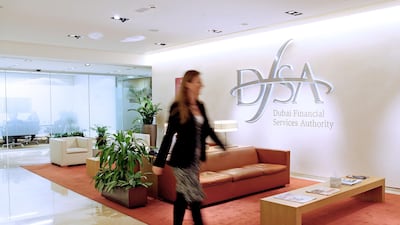Dubai’s financial services regulator fined Abraaj Group-affiliated companies $315 million (Dh1.15bn) for unauthorised activities and misusing investors’ monies.
On Tuesday the Dubai Financial Services Authority imposed penalties of $299m and $15m on Abraaj Investment Management Limited (AIML) and Abraaj Capital Limited (ACLD), respectively. These are the largest fines by the regulator to date.
The DFSA, which regulates more than 500 companies registered at the Dubai International Financial Centre, and has been working with the US Securities and Exchange Commission, said it started an investigation into the now-defunct private equity company in January last year, across multiple jurisdictions.
AIML, a Cayman Islands company now in provisional liquidation, which managed Abraaj funds, carried out “unauthorised financial services, including fund management within and from the DIFC” and that “actively misled and deceived investors in Abraaj funds over an extended period", according to the regulator.
Echoing much of the charges by US prosecutors against Abraaj’s founder Arif Naqvi and five other executives of the company, DFSA said AIML "misused investors’ monies in various funds to meet its own operating and other expenses, which included payments to entities connected to some members of AIML staff, and to meet ever-increasing cash shortfalls".
AIML concealed its activities by providing "misleading financial information to investors and making false statements about the use of money drawn down from investors and distributions", the DFSA said.
As a result of its activities two funds managed by AIML had a combined shortfall of at least $180m when the company went into provisional liquidation, according to the regulator’s estimates.
The DFSA said AIML used various tactics to deceive investors, which included borrowing money prior to financial reporting dates to produce temporary bank balances at a level expected by investors. The company also changed the reporting period for a fund to disguise shortfalls, deflected demands from various parties to provide updated financial information and bank statements; and lied about delays in making distributions of exit proceeds, according to the regulator.
ACLD based out of DIFC, also in provisional liquidation, failed to maintain adequate capital resources, deceived the DFSA about its compliance with various rules, including capital adequacy requirements, and was knowingly involved in AIML’s unauthorised financial services activities, the regulator said.
“Internal correspondence showed that Abraaj Group’s compliance function raised concerns about the group carrying on unauthorised financial services within the DIFC as early as 2009, but ACLD’s senior management ignored this,” the DFSA said.
The regulator said it will consider the companies’ circumstances and the implications of enforcing fines for fund investors, before taking any further action to enforce penalties.
“Senior management rode roughshod over their compliance function and the misconduct and deceit were pervasive and persistent,” said Bryan Stirewalt, chief executive of the DFSA. “We will pursue the persons or entities who perpetrated this activity, including those who allowed this to happen through major corporate governance breaches to the full extent of our powers.”
Abraaj, which claimed to have managed almost $14bn in funds, was forced into liquidation in June last year after a group of investors, including the Bill & Melinda Gates Foundation, the World Bank’s International Finance Corporation and the Overseas Private Investment Corporation – a US government agency – commissioned an audit to investigate the alleged mismanagement of money in a $1bn healthcare fund managed by the firm.
In a 78-page indictment, US prosecutors charged Arif Naqvi, the founder of the Abraaj, and five other senior executives of the company with systematic misappropriation of investor money. The charge sheet says Abraaj executives raided the $1.6bn Abraaj Private Equity Fund IV, also known as Fund Four, to plug shortfalls, obligations and meet due payments.
Earlier this month, British private equity company Actis acquired the rights to manage Fund Four and another fund known as Abraaj Africa Fund III.
Mr Naqvi, according to the US charge sheet, along with Waqar Siddique, a managing partner; Rafique Lakhani, a managing director; Mustafa Abdel-Wadood, a managing partner; Ashish Dave, the company's chief financial officer,;and Sivendran Vettivetpillai, a managing partner, "deceived and defrauded existing and potential investors in the US and elsewhere, including US financial institutions, US retirement and pension funds, US investment advisers, a US philanthropic foundation and an agency of the US government".
Mr Naqvi is out on $20 million bail in the UK awaiting extradition to the US, along with Mr Vettivetpillai, who is also out on bail in the UK. Mr Abdel-Wadood, who was arrested in New York, is out on $10m bail.
In a US court hearing last month, Mr Abdul-Wadood pleaded guilty to conspiracy charges and agreed to co-operate with the US inquiry into fund raising activities for Abraaj in the US.
Abraaj’s collapse was the world’s biggest private equity insolvency last year.
"Protecting the interests of investors is of paramount importance to securing their confidence and attracting foreign direct investment," said Chris Skipper, a partner with Winston & Strawn in the Middle East. The measures by the DFSA show "Dubai has zero tolerance to financial malpractice and that the emirate is committed to upholding the highest standards of corporate governance and transparency."


